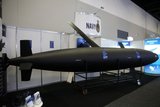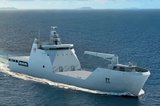US Navy commissions third Constellation-class frigate
The Constellation-class frigates will replace the Oliver-Hazard Perry-class frigates, pictured here before decommissioning in 2015. (Photo: USN)
Marinette Marine, a subsidiary of Fincantieri, has been awarded a contract to detail design and construct one Constellation-class guided-missile frigate, the USS Chesapeake, plus integrated environmental support.
The contract is valued at $536 million and is expected to be completed by August 2028.
The first Constellation class is expected to be delivered by 2026, while the USN contracted Marinette Marine for the second frigate in May 2021.
This order is for the construction of the third in class, out of a total of ten initially ordered in 2020. The overall contract, for all ten vessels, is worth $5.5 billion to Fincantieri.
The new class of frigates will replace the Oliver Hazard Perry-class frigates, the last of which was retired in 2015.
According to Shephard Defence Insight, the USN has a lack of small, inexpensive ocean-going ships since the LCS failed to materialise as planned. This means the FFG(X) programme is running on an accelerated timeline.
Related Equipment in Defence Insight
More from Naval Warfare
-
![US Navy to deploy UAVs with standard munitions in long-range strikes]()
US Navy to deploy UAVs with standard munitions in long-range strikes
As part of the Runway Independent Maritime & Expeditionary Strike programme, the US Navy is pursuing drones capable of delivering palletised rounds or 1,000lb-class munitions.
-
![Turkey targets Italian market with strategic partnership on USVs and hybrid platforms]()
Turkey targets Italian market with strategic partnership on USVs and hybrid platforms
Havelsan, VN Maritime and Piloda Defence will collaborate to develop and integrate a range of maritime solutions with a view to secure a first procurement contract in Italy in the first half of this year.
-
![Could Asia and the Middle East offer growth opportunities for Italy’s Fincantieri?]()
Could Asia and the Middle East offer growth opportunities for Italy’s Fincantieri?
Export campaigns for Fincantieri’s submarines and frigates are central to the company’s ambitions as billions of dollars in unawarded contracts come into focus.






















